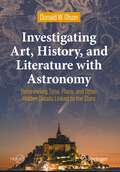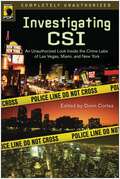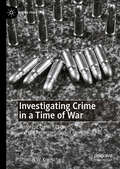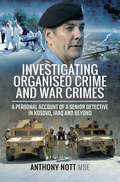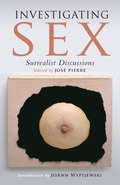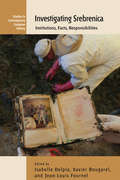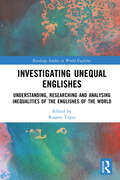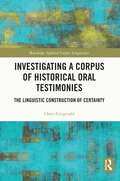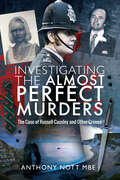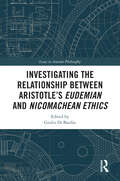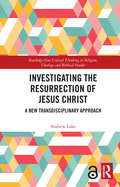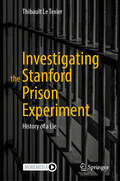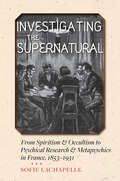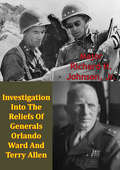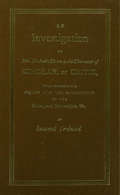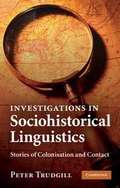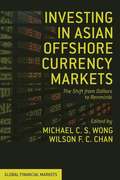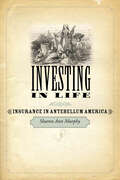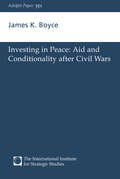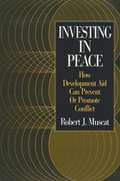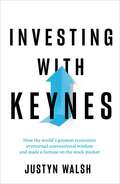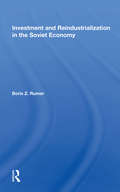- Table View
- List View
Investigating Art, History, and Literature with Astronomy: Determining Time, Place, and Other Hidden Details Linked to the Stars (Springer Praxis Books)
by Donald W. OlsonHow can shadows determine the date and time of a painting by Johannes Vermeer? How did the Moon and tides cause the loss of King John’s crown jewels? In his newest book, Professor Olson, author of Celestial Sleuth and Further Adventures of the Celestial Sleuth, explores how astronomical clues can uncover fascinating new details about art, history, and literature. He begins with an accessible introduction to amateur “celestial sleuthing,” showing how to use your astronomical knowledge, software, archives, vintage maps, historical letters and diaries, military records, and other resources to investigate the past. Follow along as Professor Olson then explores twenty real-world cases where astronomy has helped answer unresolved questions or correct longstanding interpretations about an event. Examples involve artists such as Vermeer, Monet, and O’Keeffe; the historical exploits of Alexander the Great, the desert travels of the Death Valley ’49ers, and a meeting between Franklin D. Roosevelt and Winston Churchill in Marrakech; and literary works by Chaucer, Shakespeare, and Longfellow. Packed with dozens of full-color illustrations, this book will enrich your knowledge of the past and equip you with all the tools you’ll need to become a celestial sleuth yourself. “Many people have a passion for art, or world history, or great literature, or even astronomy — but seldom in all these things at once. This remarkable book by Donald Olson of Texas State University will put you in touch with such seemingly unrelated endeavors. It will open your eyes and broaden your mind as little else could.” Roger W. Sinnott, Sky & Telescope
Investigating CSI: Inside the Crime Labs of Las Vegas, Miami and New York
by Donn Cortez with Leah WilsonThis selection of smart, accessible essays covers CSI's cutting-edge science, intriguing mysteries, and engaging personal dynamics. Essays from experts in the field illuminate such processes as DNA testing, ballistics, crime-scene photography, and autopsy procedure. With pieces that focus on the leads' varying appeals, the history of forensics on television, the show's treatment of alternate sexualities, and whether the incredible attention to detail actually gives criminals an advantage, this anthology provides an in-depth investigation that enriches the viewing experience.
Investigating Cholera in Broad Street: A History In Documents (Broadview Sources Series)
by Peter Vinten-JohansenThis book features various accounts of a cholera outbreak in West London that killed over 500 people in ten days during the late summer of 1854. What had caused the outbreak? Local authorities of the time were flummoxed about the mode by which the disease had spread. What has become known as “the Broad Street pump episode” is one of the most significant early examples of a team-oriented investigation into the causes of an epidemic―a hallmark of epidemiology and public health today.
Investigating Crime in a Time of War: Historical Crime Fiction and the Representation of Fascism (Crime Files)
by Thomas W. KniescheThis book takes a close look at crime fiction set in the interwar period and during the reign of terror of the Nazi regime. Kniesche analyzes historical crime fiction depicting Weimar and Nazi Germany with specific questions in mind: what does the text try to accomplish in regard to transmitting historical knowledge? What history is told? How is historical knowledge represented and conveyed in crime fiction? Does the historical background provide an indispensable setting for the crime story? With consideration to the degree of self-reflexivity in the texts, Kniesche probes how open the text is to an active participation of the reader in evaluating the historical knowledge that the text itself attempts to provide.
Investigating Organised Crime and War Crimes: A Personal Account of a Senior Detective in Kosovo, Iraq and Beyond
by Anthony NottTony Nott retired from the Dorset Police in 2002 at the rank of superintendent. He had spent most of his service as a detective, and had been involved in the investigation of a number of murder cases and other serious crimes.In 2000 he led the British forensic team on exhumations in Kosovo and describes the horror and brutality carried out by Serb paramilitaries. He then worked in Bosnia for the UN, where he was the commander of the eighty-strong UK police contingent. He describes in detail the investigation of human trafficking for the sex trade and illustrates some conflicting rivalries between the UN and the European Union police mission. He served a year in Iraq between 2004 and 2005 and gives insights into the Shia takeover of the police and other institutions; plus, some unsettling accounts of human rights abuses. He was involved in the investigation into the murder of British aid worker, Margaret Hassan, and is deeply critical about the role played by the UK government. He describes the difficulties he had in dealing with some senior members of the Iraqi Police; in particular, the refusal of a Deputy Minister of Interior, who declined to reopen an investigation into the murder of a British security contractor and four Iraqi citizens. The killers were suspected to be the local police. He then went onto serve two years in Israel and Palestine, where he worked with a US-led team to reform the Palestinian security services in cooperation with a European effort. Whilst this book covers the worst of human behaviour, it also highlights the bravery and triumph of the human spirit, by those ordinary people who were caught up in these events.
Investigating Sex
by Jose Pierre Dawn AdesIn January 1928, the surrealists initiated their remarkable "researches into sexuality" with a series of round-table conversations involving key figures such as André Breton, Yves Tanguy, Louis Aragon, Man Ray, Max Ernst and Antonin Artaud. The transcripts, in all their bizarre and fascinating detail, are presented here. While there is plenty of humor--not all of it intentional--the speakers were trying scrupulously to record every aspect of sexual love, cataloging preferences and positions, quality and quantity. This book is a unique historical record of sexual practice and ethics; a fundamental text for understanding the surrealist movement and, for all its idiosyncrasies, a document that still retains an extraordinary vitality today.From the Hardcover edition.
Investigating Srebrenica
by Isabelle Delpla Xavier Bougarel Jean-Louis FournelIn July 1995, the Bosnian Serb Army commanded by General Ratko Mladic attacked the enclave of Srebrenica, a UN "safe area" since 1993, and massacred about 8,000 Bosniac men. While the responsibility for the massacre itself lays clearly with the Serb political and military leadership, the question of the responsibility of various international organizations and national authorities for the fall of the enclave is still passionately discussed, and has given rise to various rumors and conspiracy theories. Follow-up investigations by the International Criminal Tribunal for the former Yugoslavia and by several commissions have dissipated most of these rumors and contributed to a better knowledge of the Srebrenica events and the part played by the main local and international actors. This volume represents the first systematic, comparative analysis of those investigations. It brings together analyses from both the external standpoint of academics and the inside perspective of various professionals who participated directly in the inquiries, including police officers, members of parliament, high-ranking civil servants, and other experts. Evaluating how institutions establish facts and ascribe responsibilities, this volume presents a historiographical and epistemological reflection on the very possibility of writing a history of the present time.
Investigating Unequal Englishes: Understanding, Researching and Analysing Inequalities of the Englishes of the World (Routledge Studies in World Englishes)
by Ruanni TupasRuanni Tupas presents rich insights into the inequalities of Englishes and the ways in which these inequalities shape and impact English and multilingual speakers from around the world.This edited volume gives a critical take on world Englishes, while showcasing for readers the various inequalities in treatment towards the people who speak English differently, as well as the injustice in that treatment. Research methodologies are explored, providing a glimpse into how data are collected and lending a more thorough look into each study and its conclusions. Chapters address the geopolitics of knowledge production in the teaching, learning and use of English, with strong representations from the peripheries of sociolinguistic studies of English. English is constructed as a language which enables socioeconomic mobility which is one factor that increases the importance of research into this issue, and this book enables researchers to widen their methods of research and apply them to their area of study.A valuable text for academic researchers, as well as postgraduate and advanced undergraduate students, to better understand the linguistic, sociopolitical and epistemic inequality in English communication. It also provides readers with alternative perspectives on lingua-cultural pluralism to unpack social inequalities and hierarchies that exist today.
Investigating a Corpus of Historical Oral Testimonies: The Linguistic Construction of Certainty (Routledge Applied Corpus Linguistics)
by Chris FitzgeraldInvestigating a Corpus of Historical Oral Testimonies guides the reader through the process of sourcing a relevant oral history archive for linguistic analysis, constructing a representative corpus out of this archive and analysing this using corpus tools. Focusing on the oral history archive at the Irish Bureau of Military History, this book shows how corpus linguistics can illuminate themes worthy of investigation that may otherwise remain hidden. This is exemplified through the investigation of how certainty is constructed in this archive through a number of expressions and which serves as a template for both how oral history can aid linguistic understanding and how corpus linguistics can contribute to oral history investigation. Highlighting why oral history archives are worthy of linguistic analysis and showing what readers can gain from blending linguistic tools and competencies with oral history data, this book is essential reading for all researchers and students working in the areas of corpus linguistics, discourse analysis and oral history.
Investigating the Almost Perfect Murders: The Case of Russell Causley and Other Crimes
by Anthony NottA British detective superintendent recounts a remarkable ten-year investigation, and other compelling murder cases he worked in his long police career. Anthony Nott joined the Metropolitan Police in 1971, in a very different world from that of today. In this memoir he describes his early experiences in the Met, including the arrest of a man for murdering a prostitute in Kings Cross. He was present when a fellow police officer was almost stabbed to death, and witnessed an act of police brutality when he interrupted the beating of a petty criminal in a cell by the CID. In 1976, he transferred to the county force of Dorset where, not long after his promotion to detective sergeant, he engaged in what would be a ten-year long investigation into the disappearance of Monica Taylor, leading to the eventual conviction of her husband, Peter, for what was almost the perfect murder—Monica&’s remains were never found. He also recounts a series of other cases in which he was involved, from the murder and decapitation of a woman in Bournemouth and the random killing of another, to the extremely violent killing of a gay man in Boscombe Gardens, Bournemouth, in which it took two years to bring the perpetrators to justice. While he served as a DCI in Bournemouth in 1994, the chance visit of a detective sergeant from Guernsey, who was investigating a life insurance fraud, led to the reopening of a missing person enquiry from eight years earlier, and resulted in the conviction of Russell Causley for murder, despite his wife&’s body also never being recovered. This book provides an insight into the methodical and transparent way in which the police investigate complicated crimes—from riots to almost perfect murders.
Investigating the Relationship Between Aristotle’s Eudemian and Nicomachean Ethics (Issues in Ancient Philosophy)
by Giulio Di BasilioSpecifically focusing on the relationship between the Eudemian and the Nicomachean Ethics, this collection of essays studies major themes from Aristotle’s ethics. This volume builds on a recent revival of interest in Aristotle's Eudemian Ethics, which offers an invaluable complement to the Nicomachean Ethics in the study of the development of Aristotle's ethical ideas. It brings together a series of new studies by leading scholars covering the main points of inquiry raised by the relationship between the two works, exploring their continuities and divergences. At the same time, it showcases a variety of approaches to and perspectives on the main questions posed by Aristotle’s ethical thought. Investigating the Relationship Between Aristotle’s Eudemian and Nicomachean Ethics is offered as a contribution to long-standing debates over Aristotle's ethical thinking, as well as an inspiration for new approaches, which take both of his surviving ethical treatises seriously. The volume will be of interest to students and scholars of ancient philosophy and ethics, particularly Aristotle’s two ethics.
Investigating the Resurrection of Jesus Christ: A New Transdisciplinary Approach (Routledge New Critical Thinking in Religion, Theology and Biblical Studies)
by Andrew LokeThis book provides an original and comprehensive assessment of the hypotheses concerning the origin of resurrection Christology. It fills a gap in the literature by addressing these issues using a transdisciplinary approach involving historical-critical study of the New Testament, theology, analytic philosophy, psychology and comparative religion. Using a novel analytic framework, this book demonstrates that a logically exhaustive list of hypotheses concerning the claims of Jesus’ post-mortem appearances and the outcome of Jesus’ body can be formulated. It addresses these hypotheses in detail, including sophisticated combinations of hallucination hypothesis with cognitive dissonance; memory distortion; and confirmation bias. Addressing writings from both within and outside of Christianity, it also demonstrates how a comparative religion approach might further illuminate the origins of Christianity. This is a thorough study of arguably the key event in the formation of the Christian faith. As such, it will be of keen interest to theologians, New Testament scholars, philosophers, and scholars of religious studies.
Investigating the Stanford Prison Experiment: History of a Lie
by Thibault Le TexierIn 1971, psychologist Philip Zimbardo ran the now famous Stanford prison experiment to show that prison could make normal people behave in pathological ways. Based on the first thorough investigation in the archives of the experiment and on interviews with about half of its participants, this book shows that the Stanford prison experiment is far from being scientific. In particular, the guards knew what results were expected from them, they were trained and supervised by the experimenters, and they were following a schedule and a set of rules written by the experimenters. The experimenters deceived the guards and made them believe they were not subjects. They also borrowed many elements from a previous student experiment without disclosing this information in their reports. The prisoners were not allowed to leave the experiment at will, and they were conditioned by the experimenters. The mock prison situation was unrealistic. Most participants did not forget they were participating in an experiment, and many responded to demand characteristics. The data was not collected properly. And the conclusions were pre-written according to non-academic aims. This book goes beyond the experiment to provide ample background and context, in order to understand how the experiment was planned, financed, recorded, and divulged in the press and within the academic. It discusses also the role played by Philip Zimbardo in the trial of one of the guards of Abu Ghraib, as well as the impact of mass media on science, the debates between personal psychology and social psychology, and the specific nature of cold war social science.
Investigating the Supernatural: From Spiritism and Occultism to Psychical Research and Metapsychics in France, 1853–1931
by Sofie LachapelleSéances were wildly popular in France between 1850 and 1930, when members of the general public and scholars alike turned to the wondrous as a means of understanding and explaining the world. Sofie Lachapelle explores how five distinct groups attempted to use and legitimize séances: spiritists, who tried to create a new "science" concerned with the spiritual realm and the afterlife; occultists, who hoped to connect ancient revelations with contemporary science; physicians, psychiatrists, and psychologists, who developed a pathology of supernatural experiences; psychical researchers, who drew on the unexplained experiences of the public to create a new field of research; and metapsychists, who attempted to develop a new science of yet-to-be understood natural forces. Lachapelle examines the practices, aims, and level of success of these five disciplines, paying special attention to how they interacted with each other and with the world of mainstream science. Their practitioners regarded mystical phenomena worthy of serious study; most devotees—with notable exceptions of physicians, psychiatrists, and psychologists—also meant to challenge conventional science in general and French science in particular. Through these stories, Lachapelle illuminates the lively relationship between science and the supernatural in late nineteenth- and early twentieth-century France and relates why this relationship ultimately led to the marginalization of psychical research and metapsychics.An enlightening and entertaining narrative that includes colorful people like "Allan Kardec"—a pseudonymous former mathematics teacher from Lyon who wrote successful works on the science of the séance and what happened after death—Investigating the Supernatural reveals the rich and vibrant diversity of unorthodox beliefs and practices that existed at the borders of the French scientific culture in the late nineteenth and early twentieth centuries.
Investigating the Supernatural: From Spiritism and Occultism to Psychical Research and Metapsychics in France, 1853–1931
by Sofie Lachapelle“A convincing account of science’s flirtation with the marginal and the marvelous” from the author of Conjuring Science (Journal of the History of the Behavioral Sciences).Séances were wildly popular in France between 1850 and 1930, when members of the general public and scholars alike turned to the wondrous as a means of understanding and explaining the world. Sofie Lachapelle explores how five distinct groups attempted to use and legitimize séances: spiritists, who tried to create a new “science” concerned with the spiritual realm and the afterlife; occultists, who hoped to connect ancient revelations with contemporary science; physicians, psychiatrists, and psychologists, who developed a pathology of supernatural experiences; psychical researchers, who drew on the unexplained experiences of the public to create a new field of research; and metapsychists, who attempted to develop a new science of yet-to-be understood natural forces.An enlightening and entertaining narrative that includes colorful people like “Allan Kardec”—a pseudonymous former mathematics teacher from Lyon who wrote successful works on the science of the séance and what happened after death—Investigating the Supernatural reveals the rich and vibrant diversity of unorthodox beliefs and practices that existed at the borders of the French scientific culture in the late nineteenth and early twentieth centuries.“What is science? . . . In her engaging book, Sophie Lachapelle probes for an answer by looking at the liminal realm between science and superstition and the attempt to render the supernatural explicable in naturalistic terms.” —Isis“A welcome addition to the growing literature on spiritism, occultism and physical research in modern France.” —French History
Investigation Into The Reliefs Of Generals Orlando Ward And Terry Allen
by Major Richard H. Johnson Jr.Between April and August 1943, the U.S. Army's II Corps saw two of its division commanders relieved of their commands. Each relief appeared tied to battlefield setbacks. MG Orlando Ward of the 1st Armored Division was relieved after his division failed to seize a narrow mountain pass near the town of Maknassy, in Tunisia. Ward's superiors labeled him too cautious, unwilling or unable to motivate his soldiers to take their objective. Months later on the island of Sicily, MG Terry Allen was relieved of command of the 1st Infantry Division. His relief followed the failure to seize the Sicilian town of Troina. Allen's superiors accused him of being too hesitant in committing his entire force to the attack. He was branded an insubordinate rebel who cared only for his own troops.In both cases, a standard history of the events emerged. It was based on the official U.S. Army account and a narrow reading of primary sources. This version of events ascribed each relief to flaws in Ward and Allen's leadership ability. The standard description of the reliefs continues to appear in recent scholarship. However, some accounts departed from the accepted portrayal, and point to alternate reasons behind the reliefs. When these alternative accounts are considered along with a comprehensive examination of primary source material, a new argument emerges. Ward and Allen were removed from command for political and military reasons of expediency. From a broader perspective, this investigation revealed how wartime leaders dealt with unprecedented circumstances to accomplish their goals. Understanding the reliefs of Generals Ward and Allen provides insight into organizational decision making and its effect on the U.S. Army in the early portion of World War II.
Investigation into Mr. Malone's Claim to Charter of Scholar: Volume 24
by Samuel IrelandFirst published in 1970. Routledge is an imprint of Taylor & Francis, an informa company.
Investigations in Sociohistorical Linguistics
by Peter TrudgillIn the last five hundred years or so, the English language has undergone remarkable geographical expansion, bringing it into contact with other languages in new locations. It also caused different regional dialects of the language to come into contact with each other in colonial situations. This book is made up of a number of fascinating tales of historical-sociolinguistic detection. These are stories of origins - of a particular variety of English or linguistic feature - which together tell a compelling general story. In each case, Trudgill presents an intriguing puzzle, locates and examines the evidence, detects clues that unravel the mystery, and finally proposes a solution. The solutions are all original, often surprising, sometimes highly controversial. Providing a unique insight into how language contact shapes varieties of English, this entertaining yet rigorous account will be welcomed by students and researchers in linguistics, sociolinguistics and historical linguistics.
Investing in Asian Offshore Currency Markets
by Michael C. S. Wong Wilson F. C. ChanThe offshore currency market is a foundation of offshore bond market, helping well-established corporations in global financing. Following the global financial tsunami in 2008 and European debt crisis in 2009-2011, this book aims to document the latest issues, challenges, trends and thoughts relating to offshore currency markets in Asia.
Investing in Life: Insurance in Antebellum America (Studies in Early American Economy and Society from the Library Company of Philadelphia)
by Sharon Ann MurphyWinner, Hagley Prize in Business History, Hagley Museum and Library and the Business History ConferenceInvesting in Life considers the creation and expansion of the American life insurance industry from its early origins in the 1810s through the 1860s and examines how its growth paralleled and influenced the emergence of the middle class.Using the economic instability of the period as her backdrop, Sharon Ann Murphy also analyzes changing roles for women; the attempts to adapt slavery to an urban, industrialized setting; the rise of statistical thinking; and efforts to regulate the business environment. Her research directly challenges the conclusions of previous scholars who have dismissed the importance of the earliest industry innovators while exaggerating clerical opposition to life insurance.Murphy examines insurance as both a business and a social phenomenon. She looks at how insurance companies positioned themselves within the marketplace, calculated risks associated with disease, intemperance, occupational hazard, and war, and battled fraud, murder, and suicide. She also discusses the role of consumers—their reasons for purchasing life insurance, their perceptions of the industry, and how their desires and demands shaped the ultimate product.
Investing in Life: Insurance in Antebellum America (Studies in Early American Economy and Society from the Library Company of Philadelphia)
by Sharon Ann MurphyA study of the early years of the life insurance industry in 19th century America.Investing in Life considers the creation and expansion of the American life insurance industry from its early origins in the 1810s through the 1860s and examines how its growth paralleled and influenced the emergence of the middle class.Using the economic instability of the period as her backdrop, Sharon Ann Murphy also analyzes changing roles for women; the attempts to adapt slavery to an urban, industrialized setting; the rise of statistical thinking; and efforts to regulate the business environment. Her research directly challenges the conclusions of previous scholars who have dismissed the importance of the earliest industry innovators while exaggerating clerical opposition to life insurance.Murphy examines insurance as both a business and a social phenomenon. She looks at how insurance companies positioned themselves within the marketplace, calculated risks associated with disease, intemperance, occupational hazard, and war, and battled fraud, murder, and suicide. She also discusses the role of consumers?their reasons for purchasing life insurance, their perceptions of the industry, and how their desires and demands shaped the ultimate product.Winner, Hagley Prize in Business History, Hagley Museum and Library and the Business History ConferencePraise for Investing in Life“A well-written, well-argued book that makes a number of important contributions to the history of business and capitalism in antebellum America.” —Sean H. Vanatta, Common Place“An intriguing, instructive history of the establishment and development of the life insurance industry that reveals a good deal about changing social and commercial conditions in antebellum America . . . Highly recommended.” —Choice
Investing in Peace: Aid and Conditionality after Civil Wars (Adelphi series #Vol. 351)
by James K. BoyceThis book analyzes the provision of aid to countries that have undergone negotiated settlements to civil wars, drawing on recent experiences in Bosnia, Cambodia, El Salvador, and Guatemala. It focuses on the potential for peace conditionality, linking aid to steps to implement accords and consolidate the peace. The book explores how aid can encourage domestic investment in peace-related needs; the reconciliation of long-run peacebuilding objectives with short-run humanitarian imperatives; and the obstacles that donors' priorities and procedures pose to effective aid for peace. It concludes that investing in peace requires not only the reconstruction of war-torn societies but also the reconstruction of aid itself.
Investing in Peace: How Development Aid Can Prevent or Promote Conflict
by Robert J. MuscatInternational intervention in internal wars has gained rhetorical legitimacy in the post-cold war period, but in practice it has remained problematic. Response to these conflicts has remained mainly diplomatic and military - and belated. Is there anything international actors can do to prevent, or at least ameliorate, such conflicts? Are conflict-prevention measures already being attempted, and sometimes succeeding so well that we are unaware of their effectiveness? If so, what can we learn from them? In this book, Robert J. Muscat, a veteran international development expert who has worked in South America, South and Southeast Asia, East Africa, and the Balkans, attempts to answer these questions. Drawing on the work of others as well as his own extensive experience, he reviews the accrued insights into the causes of internal conflict. He examines nine cases in which the work of development agencies exacerbated or ameliorated the root causes of conflict. This permits some generalizations about the efficacy or deleterious effects of development programs - and of their futility when the conflict-prevention dimension of international assistance efforts is ignored.
Investing with Keynes: How the World's Greatest Economist Overturned Conventional Wisdom and Made a Fortune on the Stock Market
by Justyn WalshA guide to John Maynard Keynes—one of the greatest economic minds of the twentieth century—for today's investor.John Maynard Keynes was a many-sided figure – world-changing economist, architect of the post-War international monetary system, bestselling author, a Baron in the House of Lords, and key member of the Bloomsbury group. He also had the talent and ability to make vast sums of money in the stock market. At the time of his death, Keynes' net worth—almost entirely built through successful stock investments—amounted to the present-day equivalent of more than $30 million. Additionally, the college endowment fund he managed had massively outperformed the broader market over a two-decade period. Keynes was a member of that rare breed—an economist who flourished not only in the rarefied heights of ivory tower academia, but also amidst the hustle and votility of the financial markets. How does a study of Keynes—the shrewd stock picker and star fund manager—benefit the modern investor? In this volatile era, Keynes' observations on stock market behaviour, in fact, are more relevant than ever. Accessible and informative, this book identifies what modern masters of the market have taken from Keynes and used in their own investing styles—and what you too can learn from one of the most influential economic thinkers of the twentieth century.
Investment And Reindustrialization In The Soviet Economy
by Boris Z. RumerInvestment activity in the Soviet Union is presently undergoing a decline hitherto unknown in the history of the nation: The growth of capital investment has stopped, while levels of production have fallen. One important factor in this phenomenon is the Soviet policy of reindustrialization—shifting new investments into the expansion and improvement of existing facilities—which severely limits capital available for new construction. In this book, Dr. Rumer examines current Soviet investment policies and assesses their impact on economic development, especially in Siberia. Reindustrialization is intended to combine more rapid amortization for updating and retooling, growth in the volume of industrial output, and minimal capital investment. However, concludes Dr. Rumer, this investment pattern hinders the development of Siberia and thus reinforces the spatial polarization of fuel-energy and raw-material resources in the east of the country and the manufacturing industry in the west, with serious consequences for Soviet strategic/military vulnerability and for the Soviet economy.
